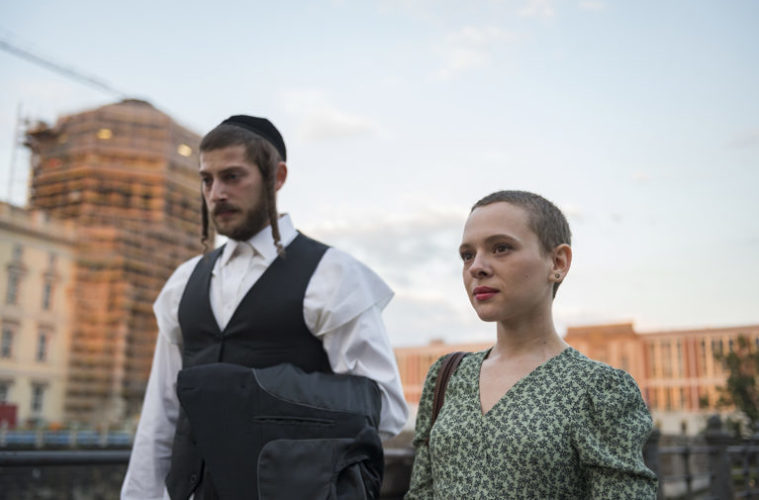Esther “Esty” Shapiro (Shira Haas) isn’t like other girls. She isn’t like most people in general. Hailing from an uber-orthodox Hasidic community in Williamsburg is enough to make her stand out from other New Yorkers, but her background as the “orphan” daughter of a runaway mother and a drunk father have done little to help her standing among her people. An arranged marriage to Yanky (Amit Rahav) and the prospect of soon becoming a mother offers an opportunity for a bright future and new acceptance. Until it doesn’t.
Unorthodox begins as Esty finds herself desperate for an exit. With the help of her piano teacher, she flees her khilh in hopes of finding a new path outside of the world taught by the Torah. This four-episode miniseries based on Deborah Feldman’s bestselling autobiography, Unorthodox: The Scandalous Rejection of My Hasidic Roots will resonate with anyone who has ever felt on the fringe.
Esty knows she is different and she tells her future husband this the first time they meet. She has yearnings no “proper” woman should have, for music and travel. And while Yanky seems to understand, he knows nothing outside of his Talmudic teachings — not about women, marriage, or adult relationships. All he knows is his religious upbringing, and his own family dynamic, driven by a controlling mother.
Esty’s story of independence is told here in nonlinear fashion, swapping back and forth from the early days of her marriage to her escape from Brooklyn to Berlin. With each chapter, the audience learns a little more about the teenager’s broken marriage and passion for music, which contrasts with a fairly compelling depiction of Jewish culture at its most stringent.
Unorthodox does an admirable job of capturing the small nuances of the Hasidic community, illustrating the importance of details — from the eruv (enclosure used by Orthodox Jewish communities to allow activities and avoid transporting objects) during Shabbos to the use of a “kosher” phone that’s rebbe approved, and so many more facets of this complex-seeming religion. The show is extremely authentic conveying the culture in its backdrops and rituals (Etsy’s first visit to the mikvah). The use of Yiddish adds to the realness here too, immersing the viewer in a largely misunderstood world that for those living in New York is only a taxi ride away from the Met. It’s also nice to see Brooklyn represented outside of the well-worn trope of hipster coffee shops, records stores, man buns and ironically-worn mom jeans.
This small screen version of Feldman’s memoir shines a light on her courage to leave an insular community that emphasizes the role of motherhood for women above all else, and hence, provides an empowering narrative. In the end, Unorthodox is a familiar story told in an unfamiliar setting. By creating a real representation of Judaism rather than a pious stereotype, it’s a refreshing tale that takes no sides. Esty is portrayed as neither better nor worse than the people she leaves behind. She isn’t used as a beacon of righteousness meant to shatter a Jewish patriarchy, either. The life she is expected to live is simply not for her, so she leaves. Watching her emancipation unfold might not be a worshipful endeavor, but it makes for a worthy binge.
Advertising disclosure: We may receive compensation for some of the links in our stories. Thank you for supporting Irvine Weekly and our advertisers.

